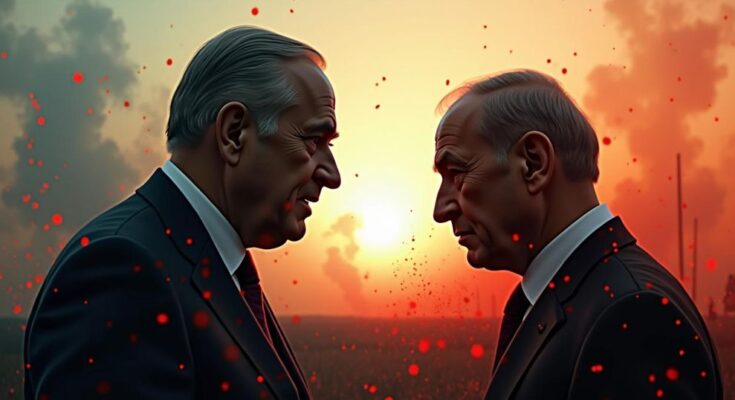UN Secretary General António Guterres has been banned from Israel following his responses to Iran’s missile attacks, which Israel’s Foreign Minister claimed failed to condemn the aggression. This move signifies escalating tensions between Israeli officials and UN leadership amid ongoing humanitarian crises and military confrontations in the region. Guterres’s remarks calling for a ceasefire were deemed insufficient, prompting accusations of bias against Israel.
António Guterres, the Secretary General of the United Nations, has been declared persona non grata in Israel following his comments regarding the recent ballistic missile attacks from Iran. Israel’s Foreign Minister, Israel Katz, condemned Guterres, labeling him as an “anti-Israel secretary-general who lends support to terrorists.” In the wake of Iran’s missile barrage—approximately 180 missiles targeting Israel—Guterres expressed his disapproval of the escalating violence in the region but did not specifically address the attack by Iran. He called for a ceasefire, stating that the broadening conflict in the Middle East “must stop.” In reaction, Katz asserted that anyone unable to unequivocally condemn Iran’s actions does not merit entry into Israel. The diplomatic turmoil highlights Israel’s ongoing tensions with the United Nations and its agencies, especially regarding their roles in the ongoing humanitarian crisis in Gaza and the broader conflict with groups like Hamas and Hezbollah. The recent escalation follows nearly a year of conflict that has seen tragic loss and further deterioration of relations between Israel and both Iran and its proxies in the region. The ongoing military operations in Gaza, resulting from the violent incursion by Hamas on October 7, have led to severe casualties, with the Hamas-controlled health ministry reporting over 41,689 deaths resulting from Israeli responses. This incident points to the persistent friction between Israel and the UN concerning the humanitarian situation and claims of bias from both parties in the conflict. Katz’s remarks emphasize the Israeli government’s discontent with Guterres’ leadership and the perceived bias against Israel in United Nations interventions. Furthermore, the historical context of these diplomatic strains reveals ongoing concerns regarding the United Nations Relief and Works Agency for Palestine Refugees in the Near East (UNRWA) and its alleged associations with militant activities, often leading to heightened tensions between the Israeli state and UN operations. The outcome of this diplomatic rupture remains to be seen, yet it underlines the complexities and sensitivities surrounding the Israeli-Palestinian conflict and the role of international governance.
This article revolves around the recent diplomatic tensions between Israel and the United Nations, specifically focusing on Secretary General António Guterres’ comments following the Iranian missile attacks on Israel. The backdrop involves a year-long escalation of conflict, primarily initiated by Hamas and supported by other Iranian-backed factions such as Hezbollah. With Guterres calling for a ceasefire without directly condemning Iran, Israel’s foreign minister interpreted this as tacit support for terrorist activities, leading to the formal ban on Guterres from entering Israel. This reflects a broader climate of mistrust and hostility between Israel and the UN, particularly in the context of humanitarian efforts during the ongoing military campaigns in Gaza and ongoing allegations regarding UNRWA’s operations. The article further discusses the toll of military actions on both sides, highlighting the human cost of the conflict and pointing to the strained relations over perceived bias in UN responses, particularly regarding Israel’s actions against Palestinian groups. This summary provides a comprehensive understanding of the ongoing geopolitical situation and the complexities entangled within it.
The prohibition imposed on UN Secretary General António Guterres reflects significant tensions between Israel and the United Nations following his inadequate condemnation of Iran’s missile attacks. Katz’s position illustrates the Israeli government’s viewpoint regarding perceived biases within UN leadership against Israel’s actions in the ongoing conflict with Palestinian factions. The continued military confrontations, particularly the high casualty numbers in Gaza, further exacerbate these international relations, signaling an urgent need for more effective diplomacy and humanitarian interventions that consider the complexities inherent in the Israeli-Palestinian crisis. The circumstances underscore the challenges in achieving a sustainable resolution and highlight the importance of clear acknowledgment and condemnation of direct acts of aggression in international dialogues.
Original Source: www.bbc.com




